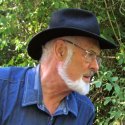Learning Journeys and Episodes
Roland Meighan’s educational perspective was underpinned by the continuous availability of educational choices… alternatives for everyone, all the time. This is a firm belief in self-determination, self-managed learning and real personalisation. The learner-researcher-traveller navigating their way within a personalised educational landscape – accessing various bespoke and packaged learning pathways. Roland developed this thinking with his notion of learning journeys and episodes.
Freed from constraints of trying to squeeze learning into the 4-16, pre-packaged schooling progression the learner has the opportunity to travel along a rich variety of learning journeys and episodes (Meighan 2005) from the available landscape.
Roland Meighan made some simple illustrations of journeys and episodes contrasting them to the limitations of restrictive schooling.
The current profile of an individual’s learning journey in the UK, for the first stages of their lives looks like this:
One to four/five years: Home–based learning with playgroups experience, and/or child-minding and nursery experience in some cases.
At four/five years: Attendance at a state school with a government dictated curriculum, testing, and inspection with a teacher-directed learning regime, apart from small minorities who attend private schools, or are home-educated by family choice.
At six years: The same
At seven years: The same
At eight years: The same
At nine years: The same
At ten years: The same
At eleven years: The same
At twelve years: The same
At thirteen years: The same
At fourteen years: The same
At fifteen years: The same
At sixteen years: Some continue with the same, some leave school and go into employment.
At seventeen years: The same
At eighteen years: Approaching half the population go to a university where they study a lecturer-directed learning regime with university dictated course contents and testing. A growing minority are choosing the more learner-friendly regime of the Open University at a fraction of the debt incurred from the old-style, ‘late-adolescent three-year exile’, university course.
Within this time period, some will have had some true educational experiences: ‘Some true educational experiences are bound to occur in schools. They occur, however, despite and not because of school.’ (Everett Reimer). But, overall, none of this has much to do with personalised learning. It is people processing. It has been said that education is ‘asking questions all the time’. The profile above is based on the idea of NOT asking questions but learning the required material, and developing only the required skills, hence the description by Paul Goodman of it as ‘compulsory mis-education’.
From the point of view of personalised education, what are the possible building blocks of a learner-managed education? I will call these ‘episodes’ and work in one year building blocks. But such episodes could be shorter – a half year or a quarter of a year. These building blocks can be seen as the macro-level of the catalogue curriculum, the alternative to an imposed, dictated curriculum. The micro-level contains the more detailed items of the content of experiences, projects, courses and, where appropriate, subjects – the whole range of all possible learning experiences available in society, including the methods of invited teaching, research, books, computers, workshops, and so on.
Here is a list of possible ‘episodes’:
1. Home-based education – properly acknowledged and supported
2. Home-based education learning co-operatives
3. Weekday programmes at Community Learning Centres (schools recycled into non-ageist centres)
4. Weekend programmes at local Community Learning Centres
5. Travel and Study year UK
6. Travel and Study year Europe
7. Travel and Study year elsewhere
8. Residential College (recycled residential school similar to the Danish Efterskole ) year with a sports focus
9. Residential College year with an arts focus
10. Residential College year with a music and dance focus
11. Residential College year with a rural studies and environmental focus
12. Year for exploration of the learner’s locality and its learning sites
13. Joining a Democratic Learning Co-operative based on the local Community Learning Centre or public library
14. Joining a City as School scheme
15. Duke of Edinburgh’s Award Scheme year or a Scouts, Guides or Woodcraft Folk year
16. Voluntary work in the community
17. Joining an ICT Virtual Learning community or programme
I am sure readers could add further options to this list.
One individual learning profile might look like this – decided by the learner in conjunction with the family and a support and advice service of a new profession of personal tutor-guides. These would be pedagogues or PEDAs for short, who would act more frequently as educational travel agents than as instructors:
Years one to five: Home–based learning with play-groups experience, and/or child-minding and nursery experience in some cases
Year six: Further home-based education and involvement in a home-based education learning co-operative
Year seven: Weekend programmes at local Community Learning Centres with further home-based learning
Year eight: Weekday programmes at local Community Learning Centres
Year nine: Year for exploration of the learner’s locality and its learning sites
Year ten: Residential College year with a rural studies and environmental focus
Year eleven: Weekday programmes at local Community Learning Centres
Year twelve: Weekday programmes at local Community Learning Centres
Year thirteen: Residential College year with a music and dance focus
Year fourteen: Joining a Democratic Learning Co-operative based on the local Community Learning Centres or public library
Year fifteen: Joining an ICT virtual learning community scheme e.g.NotSchool.Net
Year sixteen: City as School scheme combined with voluntary work in the community
Year seventeen: Residential College year with a sports focus with some music and dance
Year eighteen: Travel and study year UK
Year nineteen: Open University studies along with a Travel and Study year Europe
At the outset of such an ‘episodes’ scheme, a lot of families may ask for the familiar pattern of weekday provision for many of the years. This would be available, on request, in a flexible learning system, with the pattern decided by the learners and their families in conjunction with their personal tutor(s). But, if the experiences of the all-year-round education schemes in USA are anything to go by, the delight of the first families to vary their pattern is likely to be contagious.
In reality this is only the beginning. The types of setting available are extensive and episodes could be as long or short as desired. Choices could be bespoke and co-constructed or off the peg and packaged from the wider catalogue curriculum offers. Without the current time frames progress can be as diverse, rapid or slow as the learner chooses. Importantly, it can be right for each learner permitting learning to fit with other aspects of his (or her) life. It allows time to strengthen both the wider development of the individual and develop family and community cohesion. Some home-based learners already adopt versions of this approach and they are well attuned to this kind of adaptability. We occasionally hear of the really adventurous… families who will decide to learn together in a totally bespoke fashion perhaps whilst sailing round the world. Others will take on more conventional packages and learning journeys. The important element is that the choice lies with the learner and that the whole spectrum is available for people to mix and match as best meets their needs and circumstances.
The emergent edversity within the educational landscape described by Meighan is conspicuous for its lack of schools. Indeed, schools as we know them do not live up to the principles and values of personalisation. We cannot avoid the conclusion that they stand in the way of personalised and imaginative responses to learning and living. They are obsolete.



